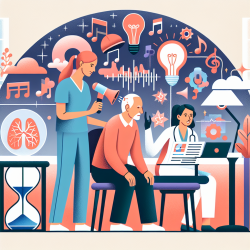Introduction
In the realm of speech-language pathology, creating optimal outcomes for children requires a commitment to data-driven decisions and an openness to learn from diverse fields. The research article, "The responsibility to care: lessons learned from emergency department workers’ perspectives during the first wave of the COVID-19 pandemic in Canada," offers profound insights that can be applied to enhance resilience and care in our practice.
Lessons from the Frontlines
The study highlights three primary themes that emerged from the experiences of emergency department (ED) workers during the pandemic's initial wave:
- Responsibility and Solidarity: ED workers felt a deep sense of responsibility to care for patients, balanced with the need for personal protection. This sense of duty was coupled with solidarity among colleagues, emphasizing the importance of teamwork.
- Engagement in Decision-Making: Workers expressed a desire to be involved in decision-making processes, ensuring that institutional guidelines were adapted to the specific needs of each ED environment.
- Moral Distress and Fatigue: The pandemic introduced new sources of moral distress and fatigue, highlighting the need for strategies to manage these challenges effectively.
Applying Insights to Speech-Language Pathology
As practitioners dedicated to improving children's outcomes, we can draw valuable lessons from these themes:
- Embrace Responsibility and Teamwork: Like ED workers, we must embrace our responsibility to provide exceptional care, fostering a collaborative environment where team members support each other. This approach can enhance our ability to address complex cases and improve outcomes for children.
- Involve Practitioners in Decision-Making: Encourage active participation in developing and refining clinical guidelines. By involving practitioners in decision-making, we ensure that protocols are tailored to the unique needs of our practice, enhancing their effectiveness.
- Address Moral Distress and Fatigue: Acknowledge the emotional and ethical challenges that may arise in our work. Implement strategies such as peer support groups, regular debriefings, and access to mental health resources to mitigate burnout and maintain resilience.
Encouraging Further Research
The study underscores the importance of ongoing research to understand the long-term effects of working through a pandemic. As practitioners, we should be proactive in conducting and supporting research that explores the impacts of our work on both practitioners and the children we serve. This commitment to research will ensure that we continue to evolve and adapt our practices based on the best available evidence.
Conclusion
The insights gained from the experiences of ED workers during the COVID-19 pandemic offer valuable lessons for enhancing resilience and care in speech-language pathology. By embracing responsibility, fostering teamwork, involving practitioners in decision-making, and addressing moral distress, we can create a supportive environment that leads to better outcomes for children.
To read the original research paper, please follow this link: The responsibility to care: lessons learned from emergency department workers’ perspectives during the first wave of the COVID-19 pandemic in Canada.










